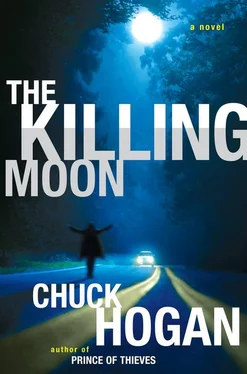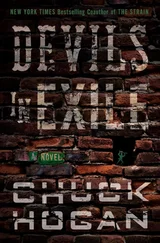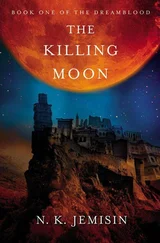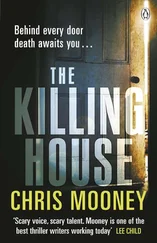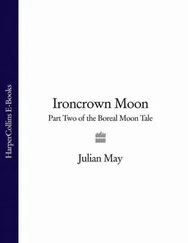“Alone? But what about your father?”
She let stillness settle like night.
Donny started to ask, then thought better of it. He sat back a bit in his chair, not knowing what to say, what to do.
Val flicked some ash, surprised he hadn’t known already. She smiled, not happily, and looked past him through the screens, through years. These were things she saw from this porch table.
“But then he did leave, he ran off to Boston. I threw myself into the scholarship as my way out. And then, after I lost that... I guess now I can say that I had a collapse. I didn’t see anyone, I didn’t do anything. Didn’t eat or sleep. All I did was go on these marathon walks. With my sketchpad and a little bottle of water, anything to get away from my house. One day I wandered out near the dump. But instead of garbage, I smelled mulch. Wet, fragrant mulch, and it drew me. And there Kane was out in front, spreading it with a pitchfork. A steamy hot day, just like this one. Putting in a little stripe of garden in front of the dump, and I thought, you know, how perfectly odd. ”
She felt a smile bunching her cheeks. Not the sweetness of memory, no, but rather the wisdom of a girl grown so much older.
“I was heavy into contradictions then. Pretending I could still be an artist, live like an artist, see like an artist. The contrast, the poetic futility of the garden — all that appealed to me. Like when you find something in the outside world you think perfectly reflects what you’re feeling inside? You respond to it. And I remember thinking to myself, about Kane Ripsbaugh, That guy looks exactly like how I feel.”
She licked her lips in an effort to douse the bitter smile, then swallowed, as though memories were food you could chew down once and for all.
“You were nineteen,” said Donny. “He was — forty? Older?”
“Well, marrying for love — do you know how new a concept that is? There are marriages of advantage and there are marriages of convenience, and I wanted out. If not from the town, then, at the very, very least, from my house. From my father. Kane owned his own house, and he wanted me. He promised me things. He even seemed to love me — who would have guessed that? The scrawny little mess I was at the time. I think I imagined I’d be like the heroine in some thick French novel, a peasant girl who claws her way out of the mud of the countryside into Paris society. I’d start with the septic man and move up, ruthlessly. Only, there never was any up.”
“Kane’s a good man,” said Donny. “I mean, he may not be...” He was wise to give up on that. There were numerous things Kane Ripsbaugh wasn’t: handsome, sweet-smelling, tenderhearted, talkative. Interesting. Young. “Nobody’s perfect. But he’ll stand by you.”
“He took me back, you mean.”
Donny didn’t want to go there. Val stubbed out her dying cigarette, already wanting another. “There are these hinge moments in life, you know? I sit out here, and I think about them. Critical turning points where your life could have completely changed, one way or the other. You know?”
“Well, sure.”
“You’re thinking I’m going to bring up the scholarship again.” Another smile opened up her face, this one bittersweet. “You won’t even remember this, but — Lynn Gavel’s party? For the yearbook staff, our senior year? We were right in the heat of our rival thing, and my ride, she had left without me, and you had your mom’s car so you were going to give me a lift home? And it was getting late, and I knew you wanted to go, but I was being all pouty and — do you remember, I wandered off down to the pond at the end of her street, and you had to come looking for me?”
“I do.”
“I wanted you to come after me. I went off on purpose — I even sent my ride home — so that you would have to leave the rest of them and come to me. I was a pout because I couldn’t figure out how to get you interested. Interested enough to kiss me.”
He started to say something else, then settled for, “No, I never knew.”
“Of course you look at me now and you think, Thank God. But that’s the thing. I would be different if I had wound up with you. So different. Not straitjacketed here. I always felt close to you, Donny. Like we had a connection. If only it weren’t for that... that damn scholarship...”
She blotted her eyes with a knuckle, harshly. She watched him try to come up with something to say other than I’m sorry, fail, and glance at the porch door.
“I’m scaring you off, huh?” Her words came out on a weird laugh.
“No, no,” he said. “It’s just that, I have to get out to see Pinty.”
“Do you ever think about what your life would be like if I had won the scholarship? Your life in this town, what it would have been?”
He nodded, begrudging her nothing. “Every day since I came back.”
“You’d have been a cop, right? Probably. And with you in there, maybe the Pail family wouldn’t have taken over. Things might be a lot different. For everybody. Probably you would have married someone in town.”
“Maybe.”
“Maybe someone — like me.”
“But you wouldn’t have been here, right? You would have won the scholarship.” He got to his feet as though afraid she would try to kiss him again. “You’d be long gone.”
“That’s right,” she said. “Long gone.”
She reached for another cigarette, knowing that, as soon as the door shut behind him, she would begin spinning their conversation around and around inside her head, her mind like a spider threading a web so elaborate, it could catch even imaginary prey.
The classical music record popped and crackled on the old hi-fi turntable. The album was one of a boxed set of six that Bucky’s mother had ordered from the television soon after he was born. She bought it to play for him and Eddie in the afternoons, hoping it would somehow calm them down. Arthur Fiedler and the Boston Pops Play Your Timeless Classics, it was called, the cover showing a bloody sun setting behind the tuxedoed conductor, who was some Einstein-looking guy. Oh, how he and Eddie used to hate it. Used to jump around the room just to hear it skip. Tried scratching it up with the needle when they were big enough to reach. Played it on 78 rpm and whipped pillow cushions at the stereo. But those goddamn thick old wax discs were indestructible.
The records found their way back out of the cabinet after his mother died. Daddy played them at night to help him fall asleep in his chair. And if Eddie or Bucky ever turned it off, the man woke up in a rage. Daddy never slept in a bed again.
Now Daddy was gone and Eddie and Bucky had split up the albums, Bucky sticking Eddie with the faggy piano pieces and keeping the Apocalypse Now music for himself. They didn’t live together. Pails had owned Jag Hill for almost as long as there was a town named Black Falls, two separate family homesteads set on opposite slopes of the otherwise undeveloped hill. Eddie stayed in the larger house a half mile away, the one they had grown up in, because Bucky preferred his uncle’s old place, which had started out as a hunting lodge and still had a pair of antlers nailed to the front door. Still had the curing shed and the old camper out in back.
Bucky was cooking up a late lunch of toasted bologna, watching the edges curl off the browning bread through the window of his toaster oven, and thinking about that freak-ass Scarecrow. When Frond first turned up dead enough to bring the staties to town, Bucky had been pissed. Everything had to be put on hold, he figured. But now he welcomed the distraction. It was perfect. Everyone running around looking for Scarecrow, the town whipped into a frenzy. And once they found him and left, then Bucky’s position in Black Falls would be stronger than ever. Pinty would be gone, along with his pet Maddox, leaving no obstacles in Bucky’s way. Total freedom to finish his “experiments” before moving on to the next stage.
Читать дальше
